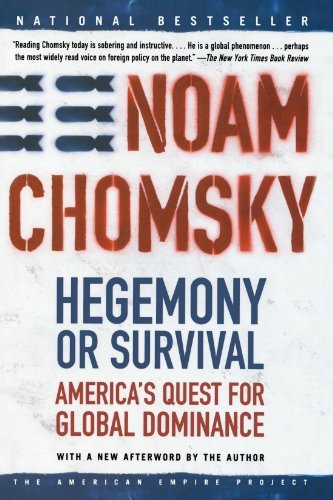
What We Say Goes: Conversations on U.S. Power in a Changing World
Book Description
What if the very fabric of global power is woven by a select few voices? In "What We Say Goes," Noam Chomsky pulls back the curtain on U.S. influence, challenging the narratives that shape our world. With incisive dialogue and sharp analysis, he exposes the machinations of authority, unmasking the forces that dictate policy and public opinion. Each chapter sets the stage for a riveting exploration of war, commerce, and democracy, revealing the stakes that affect millions. Can true change arise from the shadows of propaganda, or are we bound to repeat history?
Quick Book Summary
"What We Say Goes" presents a series of conversations with Noam Chomsky as he scrutinizes American power and its pervasive influence globally. The book explores how U.S. foreign policy is crafted and executed under the guise of democracy, typically serving elite interests while marginalizing dissent and complicating true democratic participation. Chomsky highlights the media’s complicity in shaping public opinion and warping historical narratives, demonstrating how propaganda maintains the status quo. He delves into the consequences of military intervention, economic imperialism, and the undermining of international law. Ultimately, Chomsky challenges readers to question official narratives, recognize their own agency, and consider pathways toward genuine democratic involvement and policy change.
Summary of Key Ideas
Table of Contents
The Construction of Consent and Media Manipulation
Chomsky begins by examining the ways in which public consent is engineered in the United States. He argues that the media acts as a critical arm of power, framing events and policies to fit the narrative of those in command. This manipulation fosters widespread acceptance of government actions, often without vigorous public debate. Through accessible dialogue, Chomsky unpacks how language, omission, and framing combine to create an information environment where dissenting voices are marginalized and historical context is erased or distorted.
U.S. Foreign Policy: Motives Versus Rhetoric
The book critically explores U.S. foreign policy, contrasting the stated motives—promoting freedom, security, and democracy—with the underlying pursuit of economic and strategic interests. Chomsky draws on historical examples, from Latin America to the Middle East, to illustrate a pattern of interventions that destabilize regions, undermine self-determination, and secure resources or favorable markets for American corporations. He makes clear that rhetoric rarely matches reality, and that public support is sustained through misinformation and appeals to patriotism.
Economic Power and Global Inequality
Another major theme is economic dominance, both domestically and globally. Chomsky unpacks how U.S. economic policies, international trade agreements, and military aid reinforce inequality, benefiting a small elite while devastating vulnerable populations. He links economic power with political influence, arguing that global institutions such as the IMF and World Bank serve as tools for maintaining this imbalance. These dynamics perpetuate poverty and suppress genuine development, consolidating the power structure Chomsky critiques throughout the book.
The Role of Dissent and Civic Engagement
Chomsky doesn’t limit his critique to governmental machinations—he underscores the significance of dissent and civic engagement. He notes that progress and change have historically resulted from grassroots pressures, activism, and solidarity movements. While he acknowledges the overwhelming power of entrenched systems, he advocates for persistent questioning, organizing, and education as the means for ordinary people to increase their influence and resist propaganda. Dissent, he maintains, is not only necessary but patriotic.
The Repetition of Historical Patterns in Global Politics
The final section contemplates the recurrent nature of U.S. policy errors and the repetition of imperial patterns. Chomsky situates contemporary actions in a broader historical context, warning that without a critical reckoning with the past, policymakers and citizens alike are doomed to perpetuate mistakes. He calls for a more nuanced public understanding of history and power, emphasizing accountability and vigilance to break the cycle. The book concludes with a call to action—urging readers not just to observe but to participate actively in shaping a more just and informed society.
Download This Summary
Get a free PDF of this summary instantly — no email required.





